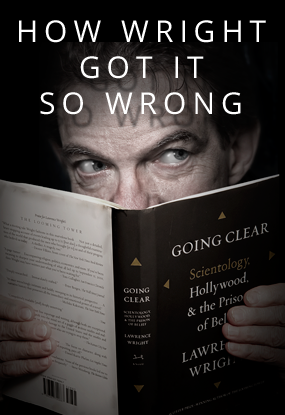A Correction of the Falsehoods in Lawrence Wright's Book on Scientology
Wright relates the allegations made in a civil suit filed against the Church and several Scientologists in Clearwater, Florida claiming they were responsible for the 2007 suicide of a twenty-year old non-Scientologist who had left his mother’s home in Virginia, traveled around the country in a confused state, and arrived at the home of his Scientologist father in Clearwater.
Wright repeats the false allegations of the plaintiff that a Church official had ordered the father to take away the son’s psychiatric medicine, and that the father and the church somehow were responsible for the suicide. Wright adds as an afterthought that “the suit was dismissed for lack of evidence.” (The end note on page 411 cites to a September 21, 2012 article in the Tampa Bay Times.)>> True Information: This is another example of Lawrence Wright’s deceptive reporting. After repeating all of the allegations of the case as if they were true, he mentions that the lawsuit was dismissed for lack of evidence, leaving readers with the implication that the events happened, but that there was some sort of technical issue with the evidence. Truthfully, the Court found that the claim was supported by NO evidence.
Wright failed to note that the case was dismissed on a Motion for Summary Judgment. This type of judgment disposes of a case without a trial when there is no dispute as to the “material facts” of the case (i.e., facts that are important to the outcome of the case) and one of the parties to the case is entitled to judgment “as a matter of law.” In such instances it would be unfair to the party, and unnecessary, to put them through the burden and expense of a trial. Further, judges are required to view all evidence presented in the light most favorable to the party opposing summary judgment.
In other words, the allegations Lawrence Wright cited as facts were found by the federal court to be untrue. This was not a case merely of a lack of evidence. It was a case of no evidence. Or, as the Judge phrased it, the case was no more than a “suspicion … not anywhere evidenced in the record.”
The judge’s extensive decision, which was upheld on appeal, of December 6, 2011 states, in part:
After a detailed elaboration of the facts (with laudable attention to the inclusion of explicit and helpful record citations) the defendants identify five factual defects that the defendants believe fatally afflict the plaintiffs’ single claim under the “Florida Wrongful Death Act,” Sections 768.16 - 26, Florida Statutes:
Plaintiff has no evidence to show or suggest that Kyle was consuming the Lexapro on a consistent basis necessary to obtain a therapeutic benefit.
Plaintiff has no evidence to show or suggest the Lexapro was removed without Kyle’s permission.
Plaintiff has no evidence to show or suggest that any defendant encouraged or assisted Kyle in committing suicide.
Plaintiff has no evidence to show or suggest that any defendant gave him access to a loaded gun.
Plaintiff has no evidence to show or suggest that Kyle committed suicide for any reason other than his depression and paranoia.
A close and objective examination of the extensive record developed in this action confirms the soundness of the defendants’ attack on the plaintiffs claim. The plaintiffs claim of Scientology’s complicity in, and responsibility for, Kyle’s death remains a mere hypothesis that is without essential support based upon reasoned and direct inference from the available evidence. In particular and in a manner fatal to the plaintiffs’ claim, the available evidence leaves irreparable gaps in the plaintiffs’ proposed historical sequence and irreparable gaps in the causal relation between persons and events and their respective consequences.
Thus, Lawrence Wright had no legal or factual justification for repeating the allegations of the case.
Further, the attorney who filed this frivolous case, Ken Dandar, was himself at the time prohibited from filing any lawsuits against the Church or being involved in litigation against the Church. He filed the case in direct contravention of this obligation and has been heavily sanctioned by courts for doing so. He has been sanctioned and criticized for his litigation tactics by state and federal courts in Florida.
This is yet another example of Lawrence Wright deliberately avoiding documented evidence to distort the truth in support of his anti-Scientology agenda.
